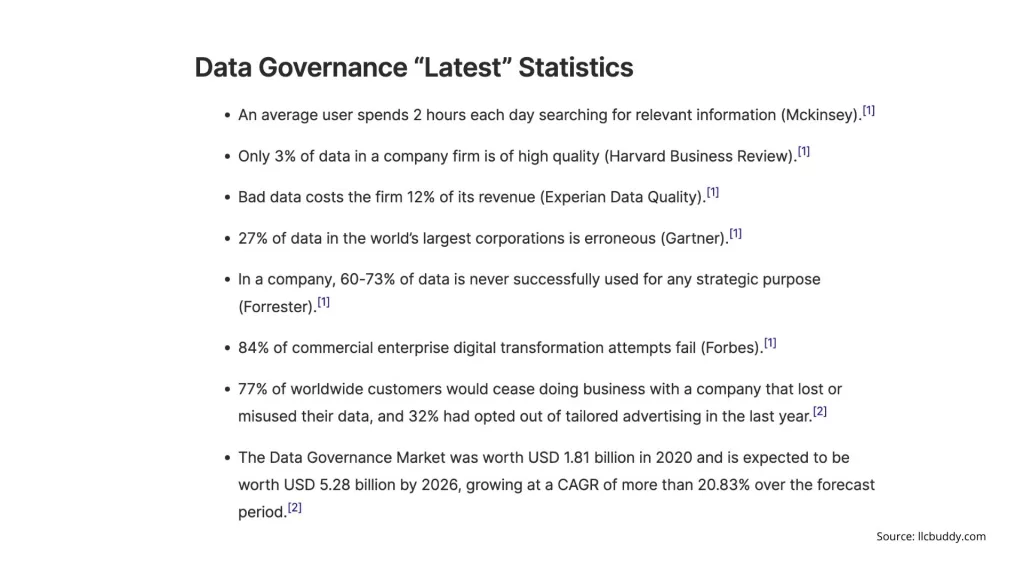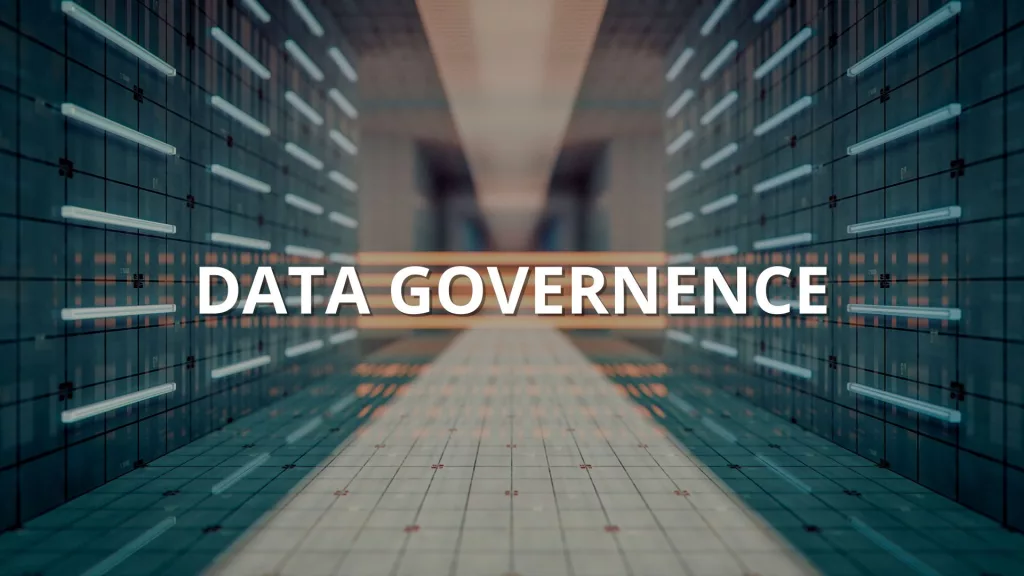In the ever-expanding landscape of data, where information flows across systems and geographies like a digital river, the significance of data governance has transcended mere checkbox formality. It has evolved into a strategic imperative, steering organizations through the complexities of exponential data growth.
This article delves into the multifaceted realm of data governance, decoding its meaning and uncovering its pivotal role in effective data management.
- Unraveling the Enigma: What is Data Governance?
- The Strategic Dance of Data Governance
- Key Components of a Successful Data Governance Program
- Orchestrating Data Governance: Challenges and Solutions
- Measuring the Symphony’s Impact: Key Performance Indicators (KPIs)
- The Crescendo of the Future: Evolution of Data Governance
- Key Takeaways
- Frequently Asked Questions (FAQs)
Unraveling the Enigma: What is Data Governance?
According to Delphix, data governance’s meaning goes beyond being a set of rules and regulations; it’s akin to a symphony, a harmonious blend of strategies, policies, processes, and technologies meticulously orchestrated to elevate data as a prized enterprise asset.
Like a guiding hand shaping the destiny of data, this holistic approach enhances its quality, ensures compliance, fortifies security, and facilitates accessibility. Imagine it as the conductor of a grand orchestra, where each element plays its unique role in extracting maximum value from the intricate tapestry of modern data ecosystems.
Also read: Why Your Business Needs Data Governance Consulting for Strategic Success.
The Strategic Dance of Data Governance

IDC forecasts that by 2025 the global datasphere will grow to 163 zettabytes (that is a trillion gigabytes). IDC expects there to be 55.9 billion connected devices by 2025 (and by the way, that number is more than 150 billion if you count RFID tags). The strategic importance of data governance becomes unmistakably clear. Often misunderstood as a mere enforcer of policies, its implications transcend the confines of rule enforcement.
Navigating the Landscape of Data-Driven Strategies
Data governance seamlessly integrates into overarching data management strategies. It provides the necessary policies, standards, controls, and accountabilities to optimize the leverage of data. Picture it as a wise guardian curbing the risks of fragmented, “wild west” data environments.
Harmony with Business Objectives
Effective data governance is not a siloed endeavor. It requires alignment with the grand orchestra of business goals and objectives. Governance initiatives that resonate with priorities such as cost savings, innovation, or customer retention wield the most impactful baton. For instance, governing customer data can orchestrate better personalization and drive top-line growth through advanced marketing analytics.
Safeguarding Against the Symphony of Risks
In an era where fines for non-compliance can reach up to 4% of global revenue (as stipulated by GDPR), data governance emerges as a critical shield for mitigating risks. Beyond compliance, it stands guard against vulnerabilities, standardizes security protocols, and institutes safeguards for sensitive data.
Also read: Vector Databases and Vector Search: A Paradigm Shift in Organizing and Retrieving Data
Key Components of a Successful Data Governance Program
The composition of a successful data governance program resembles a symphony, with each component playing a crucial role in harmony.
The Framework Ensemble
Choosing the right framework is akin to selecting the melody for the symphony. From centralized models offering unified policies to distributed federated approaches promoting agility, organizations must carefully harmonize their choice with their unique needs.
Policies, Procedures, and Standards: The Musical Scores
Effective policies, procedures, and data standards act as the musical scores of the governance symphony. They codify accountabilities across users, ensuring data integrity, accessibility, and protection. Like a well-conducted piece, they provide guardrails amidst the ever-changing dynamics of technology and data volumes.
Roles and Responsibilities: Conductor and Musicians
Data stewards, custodians, and other stakeholders don different hats in this musical journey. A data steward ensures compliance within business units, while a custodian focuses on security and storage protocols. The roles are defined, creating a cohesive and synchronized performance.
Also read: Cyber attack: Exploring the consequences of data privacy breaches
Orchestrating Data Governance: Challenges and Solutions
The journey towards robust data governance is not without its hurdles. It requires meticulous planning and execution to overcome these barriers.
Navigating the Crescendos of Challenges
Executive commitment, clear metrics, user resistance to change, budget constraints, and coordination issues can disrupt the symphony of implementation.
The Harmonious Best Practices
- Leadership Buy-In: Connect governance to strategic goals to gain executive support.
- Stakeholder Engagement: Involve stakeholders early, communicating changes transparently.
- Incremental Scaling: Start small, pilot new processes, and scale iteratively.
- Risk-Focused Policies: Focus policies on high-risk data first.
- Automation and Machine Learning: Automate policy enforcement and leverage machine learning where feasible.
Also have a look at our trending article: How to Detect Patterns of Crime Using Data Science
Measuring the Symphony’s Impact: Key Performance Indicators (KPIs)
Linking data governance to tangible business results is essential for assessing its impact.
Quantifiable Notes of Success
- Data Quality Metrics: Accuracy, completeness, and consistency rates.
- Enhanced Accessibility: Faster delivery speeds and increased user satisfaction.
- Cost Efficiency: Lower data costs and reduced redundancies.
- Proactive Violation Remediation: Faster detection and remediation of policy violations.
Case Studies: A Tale of Crescendos and Decrescendos
Microsoft’s virtuoso performance unlocked $500 million in yearly revenue through better customer data governance, showcasing how governance fuels data-driven growth (Forrester). On the other side of the spectrum, the lack of governance finesse at fintech Monzo resulted in £1.25 million in regulatory fines due to weak anti-money laundering controls.
The Crescendo of the Future: Evolution of Data Governance
As the symphony of data complexity plays on, the future demands even greater governance capabilities.

Emerging Harmonies and Technologies
- Cloud Complexity: Alters data visibility and control dynamics.
- Intelligent Governance: Automation, machine learning, and AI elevate governance intelligence.
- Blockchain’s Melody: Enables shared yet trusted data access across partners.
You might know The Evolution of Virtual Datarooms: From Simple File Sharing to Secure Collaboration
Predicting the Symphony’s Evolution
Data governance must not just respond but predict. It will transition from periodic audits to real-time, self-healing oversight powered by advanced analytics and AI. Blockchain will make distributed models more viable, offering transparency to the data melody. Ultimately, data governance will metamorphose into data intelligence management, the orchestral brain steering future data strategies.
In a data landscape growing more intricate by the day, capable data governance remains the guiding compass. Transforming disconnected data into connected insights, it stands as the maestro directing organizations to extract the maximum value from modern data ecosystems.
To delve deeper into architecting effective governance for your data, join the symphony of insights with our experts at DataGov.
Key Takeaways
- Strategic Imperative: Data governance is not a mere checkbox but a strategic imperative for organizations navigating the labyrinth of exponential data growth.
- Holistic Definition: It involves a symphony of strategies, policies, processes, and technologies that elevate data as a prized enterprise asset.
- Alignment with Business Goals: Effective data governance requires alignment with broader business goals, ensuring a synchronized performance that impacts the bottom line positively.
- Risk Mitigation: Beyond compliance, data governance acts as a shield against vulnerabilities, standardizes security protocols, and institutes safeguards for sensitive data.
- Components of Success: A successful data governance program resembles a symphony, with frameworks, policies, roles, and responsibilities playing harmoniously.
- Challenges and Solutions: Implementation hurdles can be overcome with proper planning, executive commitment, stakeholder engagement, and incremental scaling.
- Measuring Impact: Key Performance Indicators (KPIs) such as data quality metrics, accessibility improvements, cost efficiency, and proactive violation remediation gauge the impact of data governance.
- Future Symphony: As data complexity increases, the future demands even greater governance capabilities, with emerging technologies like cloud, automation, machine learning, and blockchain playing crucial roles.
Frequently Asked Questions (FAQs)
1. How does data governance facilitate data quality and integrity?
Data governance ensures high-quality and reliable data by implementing processes, policies, and standards that define how data is managed, accessed, and protected. It establishes accountability, transparency, and consistency in handling data, fostering an environment where data quality and integrity are paramount.
2. Can small to medium-sized enterprises (SMEs) afford to implement data governance?
Yes, data governance is scalable, and SMEs can adopt tailored approaches that align with their size and resources. By starting with prioritized governance initiatives, leveraging technology, and focusing on high-impact areas, SMEs can effectively manage their data governance needs within budget constraints.
3. How does data governance intersect with data privacy regulations?
Data governance plays a pivotal role in ensuring compliance with data privacy regulations such as GDPR and CCPA. It involves implementing controls, policies, and procedures to protect sensitive data, provide transparency on data usage, and enable timely response to data subject requests. Navigating the complexities of data privacy laws requires a robust data governance framework.










Leave a Reply